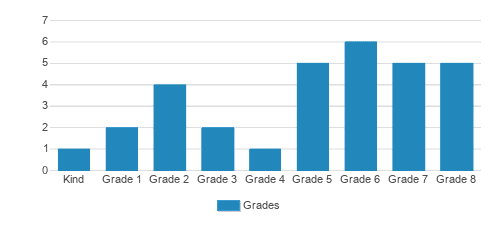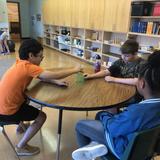P.L.A.I.D. (Positive Learning in an Atmosphere of Individual Development) Academy's goal is to welcome each child into the realm of the successful independent learner.
The learning experience designed to achieve this goal places equal emphasis on knowledge, comprehension, application and creativity.
While basic elements may be traditional, the learning experience is often unique. Multi-sensory teaching techniques and integrated curriculum encourage synergy for the learner between classroom experiences and real world expectations.
Community resources are used to enrich the curriculum. Our small class size allows for individual attention and the interaction between students.
The right of each child to realize his or her learning potential is recognized side by side with the belief that self-confidence and the ability to work well with others help the student realize the full benefits of education.
School Overview
Religious Affiliation
Grades Offered
Grades Kindergarten-8
ADD/ADHD Support
Yes
Learning Difference Programs
Yes
Learning Programs Supported
Dyslexia, language-based, mild learning differences
Year Founded
1994
Student Body
Total Students
31 students
Student Body Type
Co-ed
% Students of Color
78%
State avg.: 34%
Students by Grade

Academics and Faculty
Total Classroom Teachers
6 teachers
Student : Teacher Ratio
5:1
National avg.: 13:1
% Faculty w/Advanced Degree
75%
Classroom Dress Code
Formal
Uniform
Tuition and Acceptance Rate
Admission Deadline
None / Rolling
Yearly Tuition Cost
$10,000
Tuition Notes
see www.plaidacademy.org
Acceptance Rate
86%
National avg.: 85%
Admissions Director
Jean Altman
School Notes
- P.L.A.I.D. Academy opened its doors in 1994. A state recognized private school, the learning experience places equal emphasis on knowledge, comprehension, application and creativity. PLAID graduates are self-confident, independent learners who successfully transition into the high school of their choice. Through a traditional, yet innovative curriculum, PLAID students continually assess skills, set goals and evaluate progress. Multi-sensory teaching techniques and an integrated curriculum encourage synergy for the learner between classroom experiences and real world expectations. Frequent field trips are utilized to enrich the curriculum. Small class size allows for individual attention and the interaction between students. Enhanced Curriculum includes Chinese, Hip-Hop, yoga, swim, and President's Physical Fitness Program, Extracurricular and Intramural activities and an Extended Day Program. P.L.A.I.D. also offers ELS, Essential Learning System, which is an individualized program that addresses learning differences and accelerates student progression. Mulit-sensory exercises enhance linguistic acquistion, coding and transfer learning. Sensory Integration Training develops reflexive learning and links visual, auditory, and motor development.
Source: Verified school update
Frequently Asked Questions
How much does PLAID Academy cost?
PLAID Academy's tuition is approximately $10,000 for private students.
What is the acceptance rate of PLAID Academy?
The acceptance rate of PLAID Academy is 86%, which is lower than the national average of 90%.
When is the application deadline for PLAID Academy?
The application deadline for PLAID Academy is rolling (applications are reviewed as they are received year-round).
Recent Articles

A Parent's Guide To Understanding High School Teaching Methods
This comprehensive guide helps parents navigate the various teaching methods used in today's high school classrooms. By understanding these approaches, you'll be better equipped to support your teen's learning journey, communicate effectively with teachers, and create a complementary learning environment at home.

February 08, 2025
Social Emotional Learning: Education's Hidden SymphonyA musician's perspective on Social Emotional Learning reveals how this educational framework orchestrates success through five essential emotional competencies.

January 24, 2025
A Roadmap For Starting A Private SchoolUse this roadmap as a set of talking points with your trusted mentors and professionals to start the private school of your dreams. You're not alone. Over the years, hundreds of folks like you have had the same dream. From Quintilian to Maria Montessori to Lucy Madeira Wing, visionary educators have established schools to teach according to their beliefs and methodologies.
















